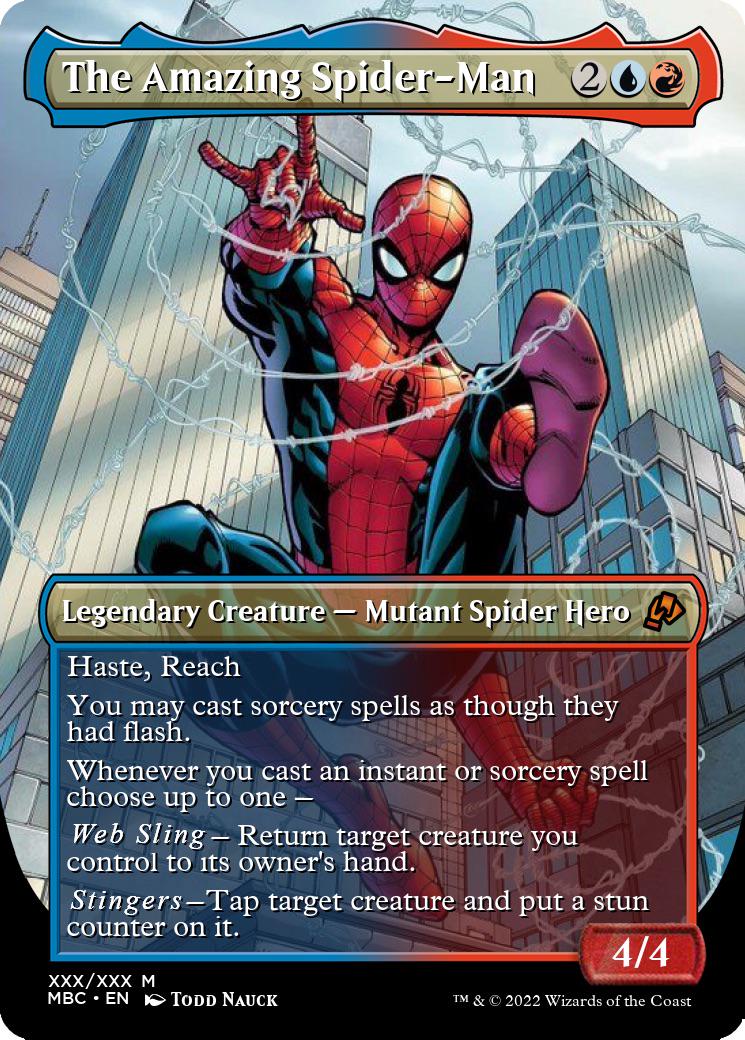When Wizards of the Coast first announced a Spider-Man-themed Magic: The Gathering set, the anticipation was palpable among players both casual and competitive. Yet, as the details unfolded, there was a notable absence that left Commander players in a bit of a web-induced tizzy—there weren’t any preconstructed Commander decks. For a community that thrives on innovation, creativity, and thematic integration, this felt like a missed opportunity. Enter Spider-Punk: the unconventional, guitar-wielding hero who might just be the wild card the format was missing.
Spider-Punk isn’t your typical web-slinger. Costing only two mana to summon, he bursts onto the battlefield with a rebellious Riot ability. This lets the player decide if he should show up fashionably late with haste or come pumped with an extra +1/+1 counter. But, while his punk rock style is all well and good, that’s not the real reason veterans of the game have adjusted their specs and sharpened their pencils for a fresh take on deck-building strategy.
The true power of Spider-Punk lies in the chaotic rules he forces upon the entire battlefield. Once this punk rocker plants his bass guitar on alien Manhattan territory, the meta game shifts dramatically—he waves goodbye to any possibility of spells or abilities being countered, and bids adieu to the prospect of preventing damage. No more theoretical safety nets like Counterspell, the catch-all protection of Teferi, or the invincibility granted by The One Ring. For some MTG enthusiasts, it’s the kind of anarchic red disruption that’s been whetting their appetite, living in that sweet spot between reckless courage and calculated chaos.
Naturally, a figure as polarizing as Spider-Punk has split the Magic community right down the middle. On one hand, he’s a veritable dynamo for seizing the initiative. Without the lurking fear of interruption, players can boldly push for a win, disrupted only by their own miscalculations. Yet, there’s no chapter of Spider-Punk’s saga that doesn’t come with a rub. Pass the turn, and your ominously smiling rival could unleash instant-speed threats, unfettered by the usual restraints as they strut under the same non-counterable sky. Besides, let’s not forget his relatively pint-sized frame makes Spider-Punk about as sturdy as tissue paper in a monsoon, and dismissing him could well be a swift endeavor for the opposition.
Nevertheless, his potential isn’t lost on the Magic faithful. Interest in Spider-Punk has stormed the gates even before he officially hit the streets. Regular editions are eagerly snapped up at prices in the low twenties, foil versions glisten toward the sixty mark, and special borderless designs are being valued anywhere from forty-eight to fifty-five dollars. Such fervor for a single card speaks volumes about the intrigue and potential he holds.
Yet, focusing solely on Spider-Punk would be missing the bigger picture. The set has woven a deeper narrative into the game’s tapestry. The Soul Stone, for instance, is already establishing itself as the prime contender for most coveted card. An indestructible tool that functions as a mana rock, while moonlighting as a reanimation catalyst—a strong contender for any lover of relentless recursion. Meanwhile, Doctor Octopus has thrown his hat into the arena too, providing an intriguing prospect for aficionados of Villain tribal decks, featuring a card draw mechanic to boot. If that’s not enough to keep deck builders’ synapses firing, the Green Goblin is making waves with the “Mayhem” ability. This discard-focused game mechanic allows those tossed-aside cards to be repurposed into on-board threats, challenging players to reconsider what constitutes garbage and what shapes the next masterstroke.
Would Spider-Punk’s radical approach prove revolutionary, enabling players to hammer out a beat that keeps the table buzzing with newfound unpredictability? Or would the spotlight soon dim, revealing Spider-Punk to be another fleeting fascination?
As the community buzzes with speculation and calculation, one certainty remains—the lore of Magic: The Gathering has, yet again, been enriched by the introduction of a multiverse where comic book pages intertwine with spell books. For Commander enthusiasts, Spider-Punk has at least started some engaging conversations and—whether embraced as a new icon or critiqued as a reckless risk-taker—brought a fresh reverberation to the spell-slinging soundscape. As such, the arrival of Spider-Punk and his adjacent personalities serve not just as a thematic crossover, but as a catalyst for the boundless creativity and unpredictability that the game endears in its players. Magic fans have plenty to “web” together as they explore the endless possibilities this new dimension offers.
